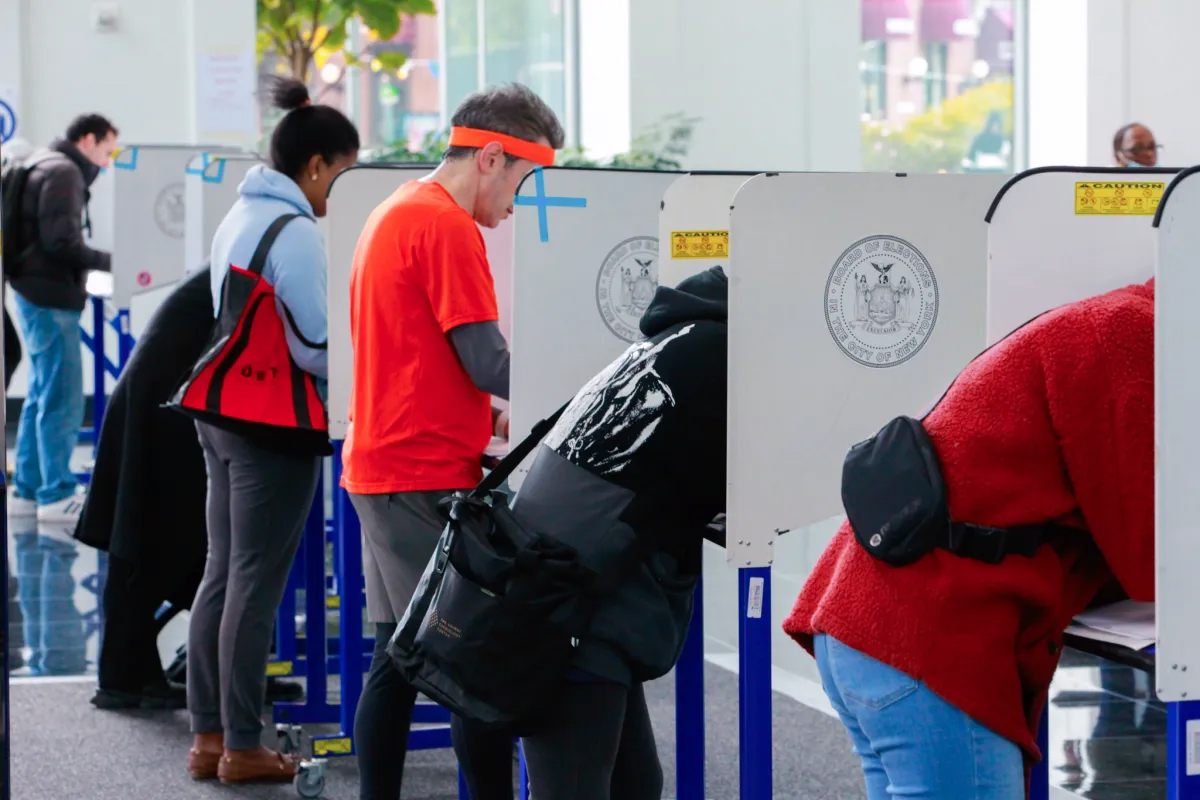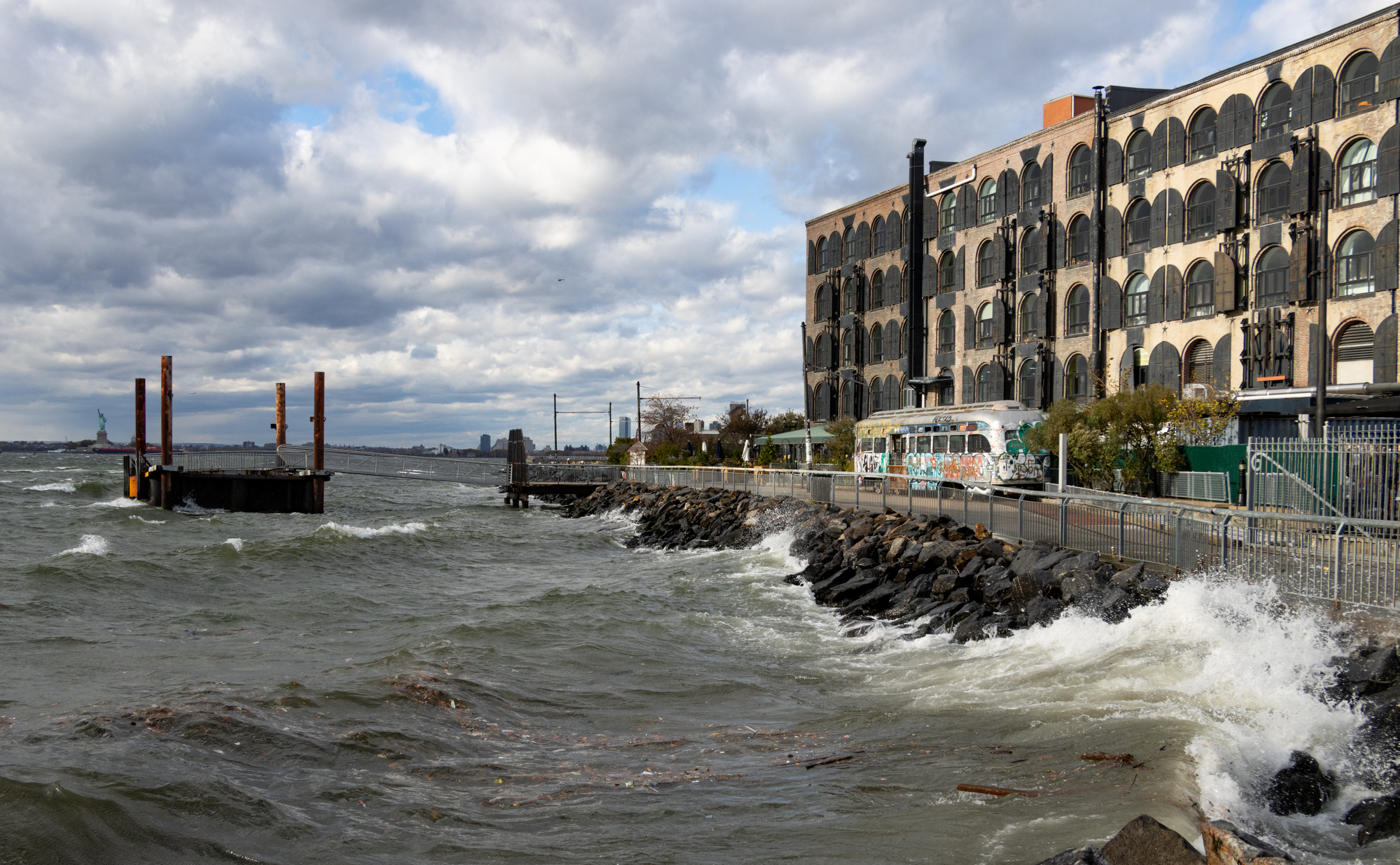Resurrecting Red Hook's Trolley Tracks
There’s been some talk in recent years about the possibility of creating trolley lines to service areas of Brooklyn and Queens that are hard to access by public transportation, but now the idea is officially on the table. According to NY1, at a campaign event earlier this month, Mayor Bloomberg said that he is interested…


There’s been some talk in recent years about the possibility of creating trolley lines to service areas of Brooklyn and Queens that are hard to access by public transportation, but now the idea is officially on the table. According to NY1, at a campaign event earlier this month, Mayor Bloomberg said that he is interested in trolley service, and his team is currently investigating the feasibility of using the city’s old trolley tracks, starting in Red Hook. Bob Diamond, president of the Brooklyn Historic Railway Association, is enthusiastic about the idea, saying: “A light rail or a streetcar line usually costs about one-twentieth of what a subway line would cost. And they’re outside, and they use existing streets, so there’s no right-of-way acquisition and the track can be built very quickly.” Now the Department of Transportation will study the feasibility of a light rail or trolley system in Red Hook, research that is financed with about $300,000 in federal funding and should begin this year.
Trolleys Could Make a Comeback in Red Hook [NY1]
Trolleys Coming to Red Hook? [Cobble Hill Blog]
Could Streetcars Return to Brooklyn? [Brownstoner]
Streetcars for Brooklyn: a New Life? [Transport Politic]





I found San Fran’s trolley system to be nostalgic and a bit outdated. It wasn’t much faster than walking and seemed to be more of a tourist gimmick than anything. Portland OR, on the other hand, had a convenient, modern, efficient light rail system that would be awesome in Brooklyn. I’d love to be able to take a light rail from Grand Army Plaza to Red Hook.
Hi folks;
Late to the party, as I’m travelling on business in San Jose, California. I have to make it quick:
FSRG and Sparafucile are dead on. They’ ve made most of the correct arguments, but let me add one more. In making this argument, please note that I am a mechancial engineer, and studied this topic in my university days.
In this time when there is great concern about global warming and our overall energy policy, I think it is downright irresponsible to propose trolleys over buses. The process of distributing electricity is HIGHLY inefficient. Only about one-third of the power that is generated in the central plant is used by the end-applicance, be it a trolley or a washing machine. The rest is lost to heat generated by the resistance of the power-transmission cable.
By contrast, an internal combustion engine is highly efficient. To those who complain about the emissions on the street, I would recommend that they go to a city that has modern buses. I recently travelled to Hamburg, Germany, where most of the trolleys have been replaced by gas-fired buses. They are quiet, and clean.
I agree that the hankering for trolleys is driven mostly by nostalgia, not by rational principles of transportation, engineering or economics.
I’m trying to imagine that there are people, even here in NYC, that are so arrogant, entitled, or just plain stupid to leave a vehicle unattended on an active railway.
I suppose if you have a view half a mile back and see no train, you could figure on running in to drop off dry cleaning, or some other such chore.
But really the human race is done a disservice to imagine there are those among us that would park a truck to load/unload on a transitway.
I have experienced in-street light rail in Portland, OR and Freiburg, Germany. Much nicer than buses. By a long shot.
I’d like to see them on Manhattan’s major crosstown streets.
fsrq… streetcar systems are not legacy systems necessarily and many of the most promising examples are not (Portland, Paris and Amsterdam recent expansion, etc. etc.) That being said, I think NYC and specifically Brooklyn should look at the streetcar networks that were ripped out/covered up from yesteryear (and replaced by buses) Those same routes are probably, in many cases, very viable.
Yeah — that’s why i said local emissions. A power plant creates energy FAR more efficiently than a combustion engine and the emission source is, generally, not in your face. I agree, there SHOULD be electric buses. BUT, I disagree, there are most definitely instances where are Streetcar (on street) or even a Tram (protected tracks) would serve the needs of the city far better.
I dismiss the “nostalgia” claim — yes, it does make it a bit attractive, but i know it’s used as a pejorative by opponents — and that’s how I read your use of “psychological” as well. Simple things like comfort are psychological too, but have a huge impact on ridership. A streetcar is usually more comfortable than a bus because of the mechanical requirements of each vehicle — folks are willing to ride further distances and ride more often. That’s NOT a small thing.
tybur6 – 1st of all psychological/nostalgic doesnt equal bad – as anyone looking at the tourists waiting for a streetcar in Sf can attest. But just because other cities have streetcar systems (most of which are legacy systems) doesnt mean that it is therefore “better”.
Every city is different (ex – width of streets, $ available, demographics)
but even if you look at the benefits you cite – many are possible with a bus (if your so inclined) – they have nothing to do with if it runs on metal or rubber wheels – i.e. entry exit, passanger load,fare collection, enforceable right of way. The rest really are psychological (“sense of permanence, set routes for easier understanding, )
Essentially all a bus is, is a street car with an engine and wheels that steer….
and as for your emissions argument – streetcars run on electricity, electricity is generally locally generate – i.e. it isnt zero emmissions, and certainly neither is the environmental cost of BUILDING an entirely new system, with entirely new vehicles for it. If you really were focused on the environment – electrc buses with a permanent right of way would be far better…
1) I see articulated buses all over Manhattan, on pretty much every crosstown route.
2)You still haven’t explained why this different fare collection system and change in culture (I am sincere in wishing that an honor system would succeed) couldn’t happen on buses just as well as on trolleys.
3) Car crashes do happen. Cars and trucks do double park, even though they’re risking towing. Trolley lines won’t come equipped with pixie dust that magically makes collisions and anti-social driving disappear.
4) I grew up in a city with trolleys, and was a daily trolley commuter all through middle school and high school. I speak from first-hand experience about the disadvantages of a fixed-track vehicle on a shared roadway. The point is that it doesn’t take a quagmire to bring a trolley line to a halt. A single disabled vehicle anywhere on the line is all it takes.
5) Trolley with a dedicated right-of-way could work. Trackless trolleys (bus chassis with electric motor powered by overhead wires) could work. Fixed tracks sharing right-of-way with other vehicles doesn’t work.
I’m all for improved mass transit but running trolleys in the streets is not the way to do this. In Boston, where they still have trolleys, after years of grief, they finally got rid of the lines that run in the streets. Light rail (trolleys) that run in a designated right of way have proven much more practical. As mentioned above, running light rail under existing highways or using streets that are under-utilized would make a lot of sense for Brooklyn.
Saparafucile… I remember you, the last time this topic came up you were spewing the same garbage.
Articulated Bus — How many of those do you see in this city?! I wonder if there’s a reason we don’t have any?!
In a larger vehicle, you CAN have a different fare collection method. You can have two entrances taking fares. Streetcars can be an opportunity to change the faretaking method/culture altogether! like the ‘honor system’ they are piloting on some of the longer commuter bus lines from Queens (?)
And why is maneuverability so important? Umm… you don’t have a street fair on the street with the streetcar! Trucks aren’t going to double-park on train tracks… and if they do (because they are completely retarded) they are towed and fined heavily and it doesn’t happen again.
Do you really think the need for “maneuverability” is that big of a deal?! Seriously? Are the hundreds of streetcar lines around the work trapped in this absurd quagmire that you’ve illustrated?! Defined, easy to navigate routes, that clearly demarcate economic areas and provide regular service on vehicles that are far more comfortable and appealing than a bus…. How is this negative?
Yeah — streetcar infrastructure costs more. But the vehicles last a lot longer, they have ZERO local emissions, electric/hybrid buses can many times SHARE the overhead wires if the bus/streetcar route intersects/overlaps, and so on…
Diamond installed tracks on Conover and Reed Streets a few years ago, he ran out of funds, and the city then promptly ripped them up and paved them over. Now they want to restart the whole thing again?
http://www.forgotten-ny.com